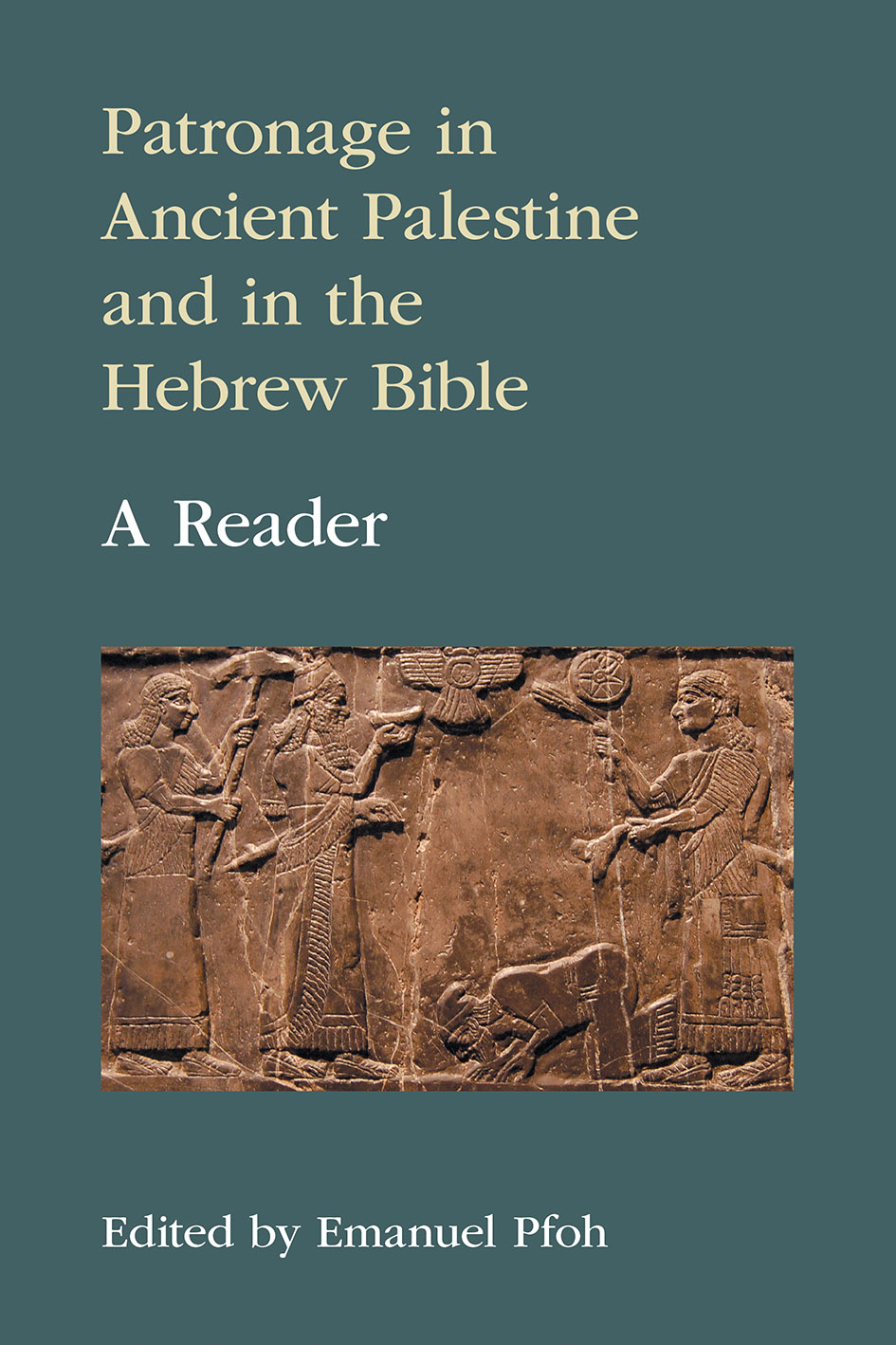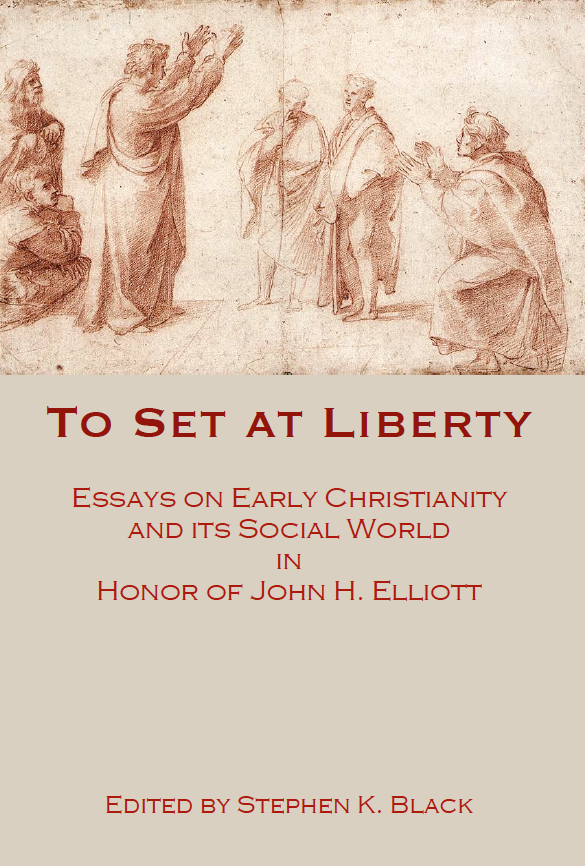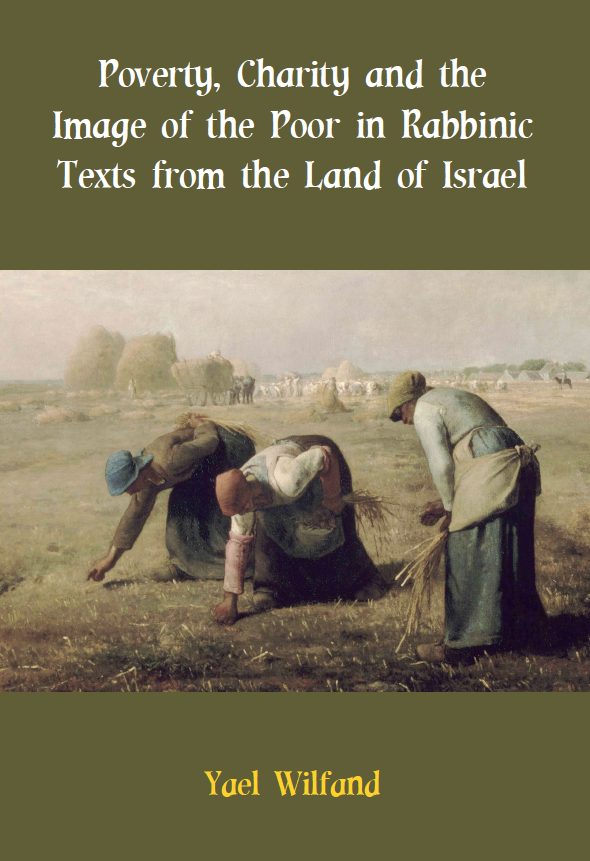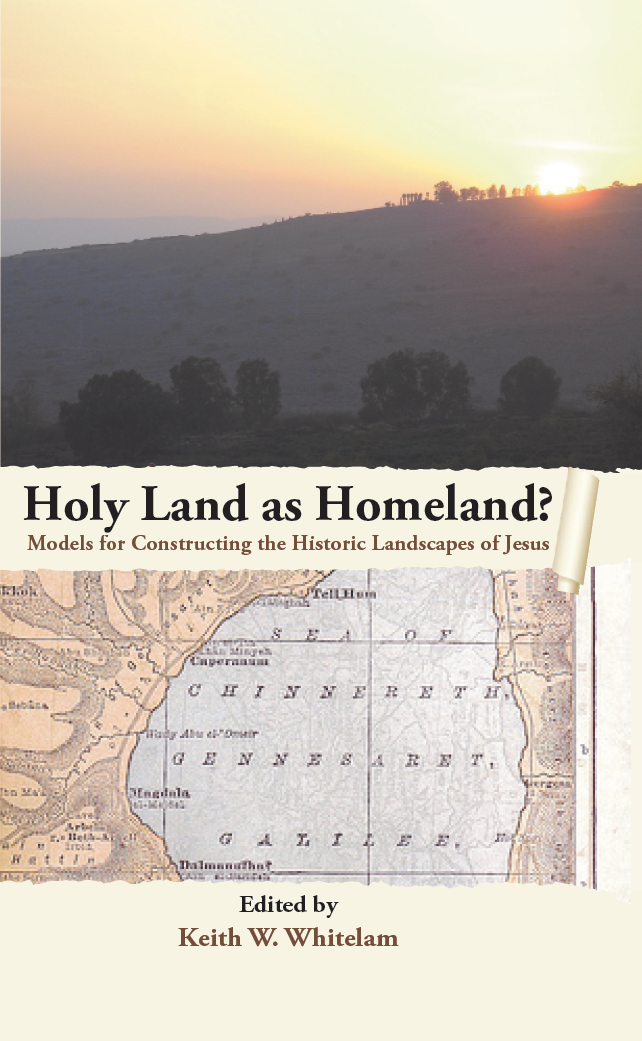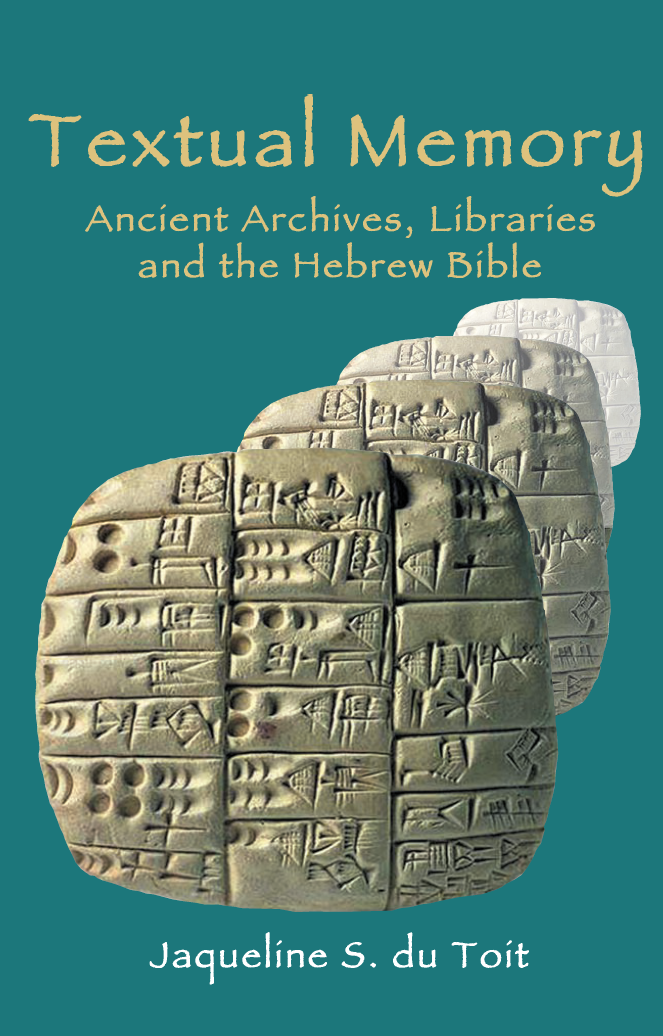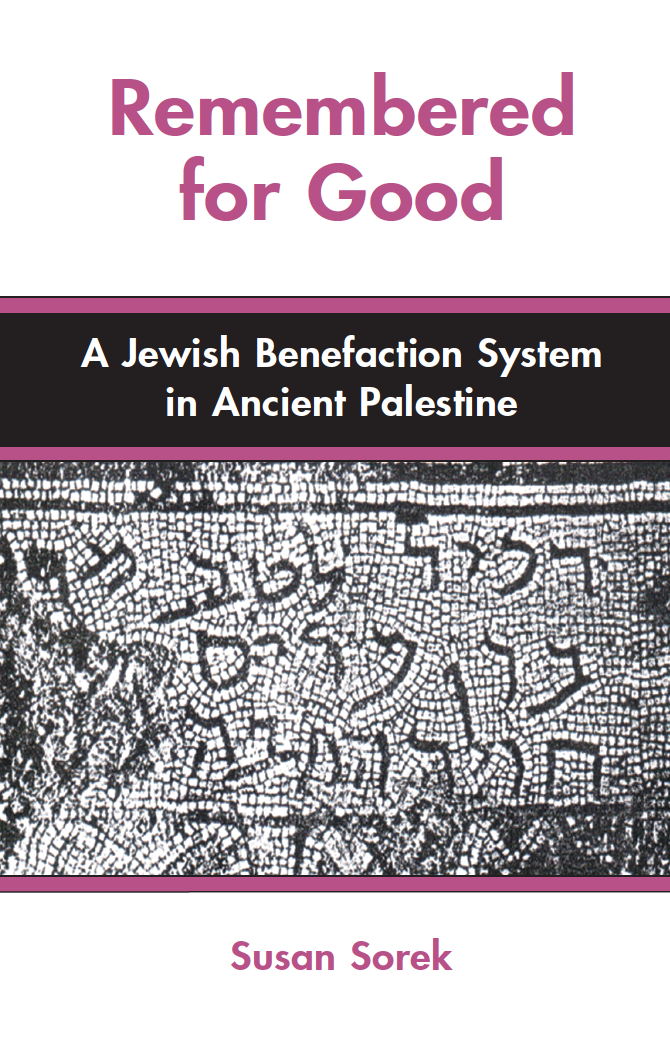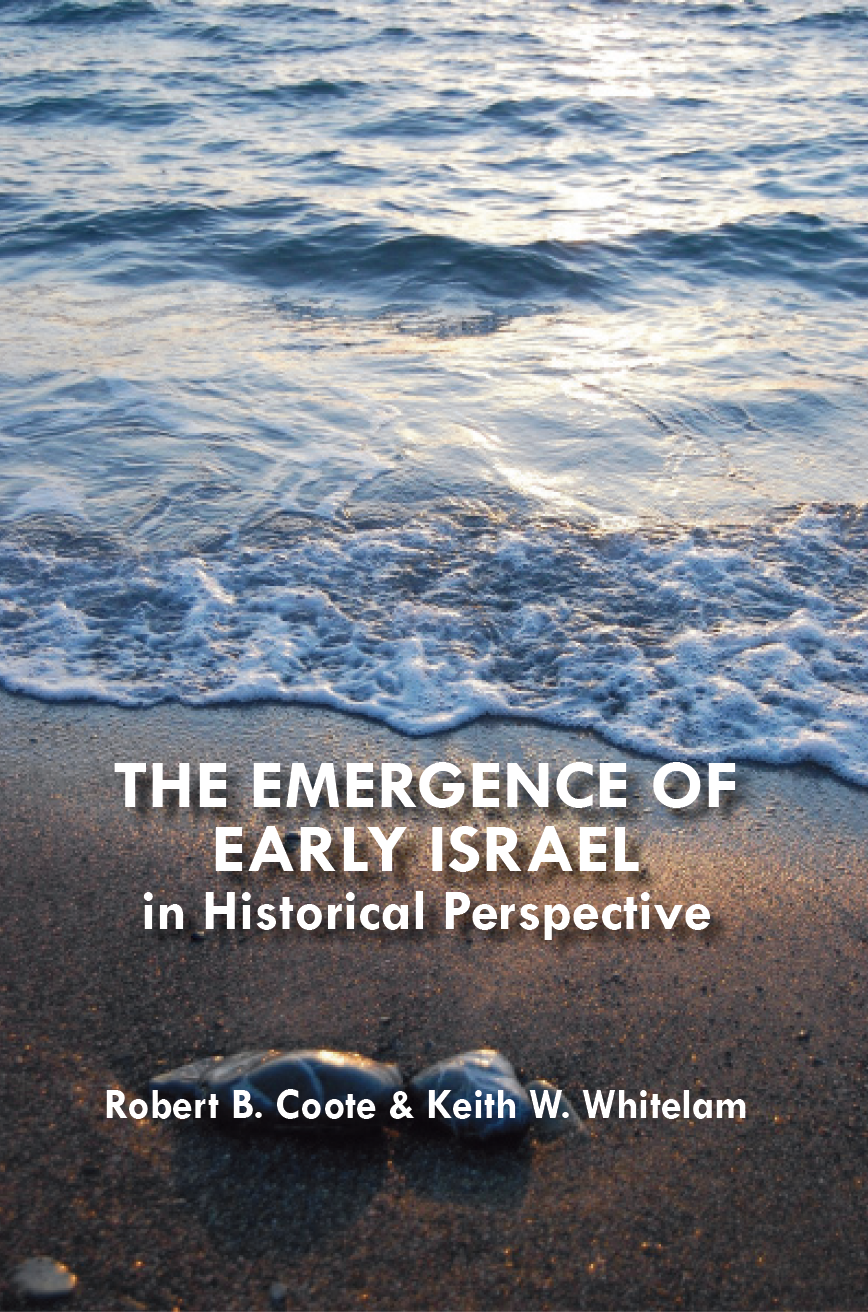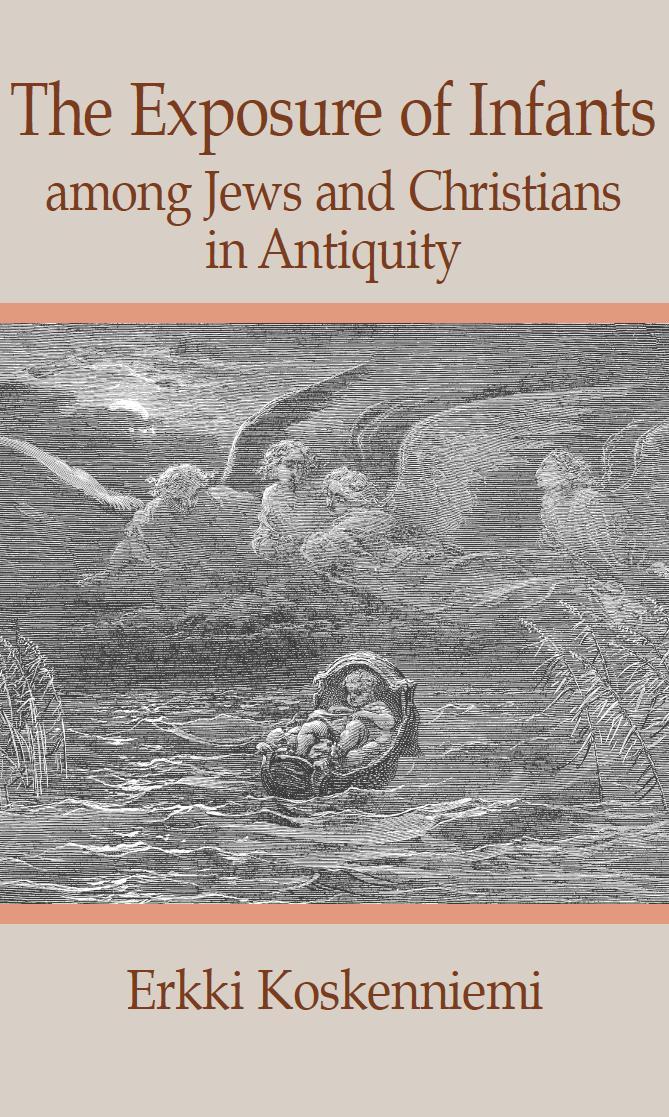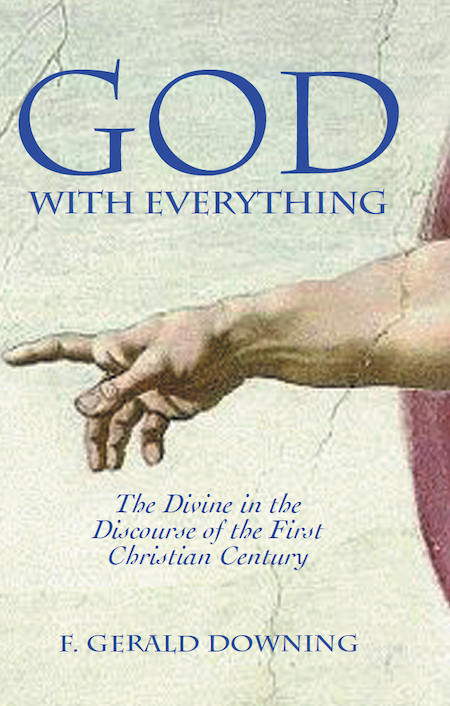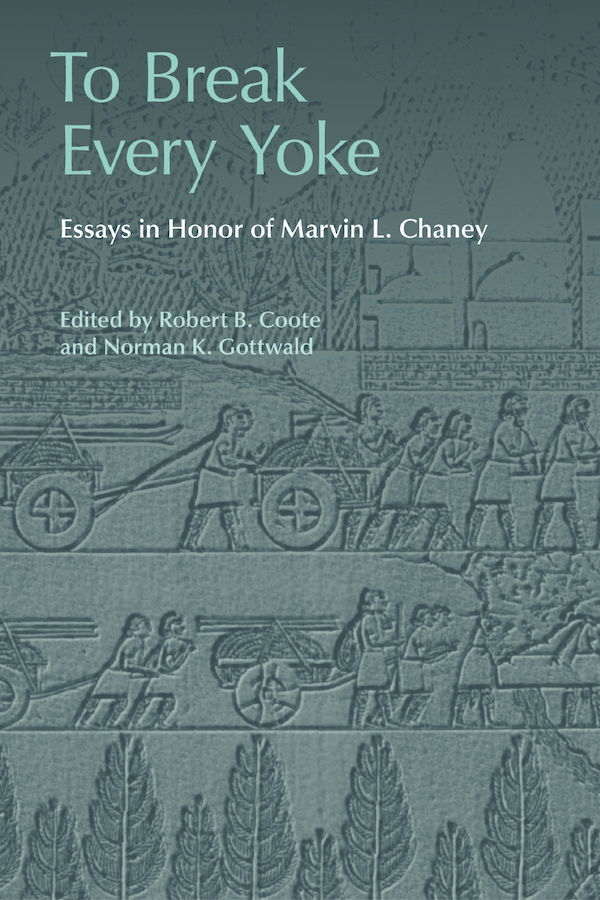Patronage in Ancient Palestine and in the Hebrew Bible: A Reader
By Emanuel Pfoh
Published: May 2022
£80.00
Patron—client relationships have been documented and studied by anthropologists and sociologists since the 1950s. They are known in rural settings and urban locations alike, and virtually in every region of the world. But it was only in the last decades of the twentieth century that this analytical model was slowly incorporated into the socio-political interpretation of biblical texts and other ancient Near Eastern sources. The patronage model proves to be a useful interpretative tool, casting new light on many aspects of the history of Israel and of other socio-political communities in the southern Levant. Moreover, the concept of patron—client relationships clarifies many of the implicit socio-politics found in the narratives and motifs of several biblical books.
This remarkable and comprehensive new reader collects over 20 studies by renowned scholars dealing with different aspects and situations of patronage: in the context of Southwest Asia (the 'Middle East') during the second millennium bce, in relation to the history of ancient Palestine during the first millennium bce, and as well with references to patron—client ties in texts of the Hebrew Bible. While these selected papers do not presume to offer an exhaustive treatment of periods, historical cases and themes in ancient Palestine and in Hebrew Bible literature, they variously illustrate the many possibilities of the concept of patronage to elucidate them.
Patronage in Ancient Palestine and in the Hebrew Bible: A Reader
By Emanuel Pfoh
£80.00
Patron—client relationships have been documented and studied by anthropologists and sociologists since the 1950s. They are known in rural settings and urban locations alike, and virtually in every region of the world. But it was only in the last decades of the twentieth century that this analytical model was slowly incorporated into the socio-political interpretation of biblical texts and other ancient Near Eastern sources. The patronage model proves to be a useful interpretative tool, casting new light on many aspects of the history of Israel and of other socio-political communities in the southern Levant. Moreover, the concept of patron—client relationships clarifies many of the implicit socio-politics found in the narratives and motifs of several biblical books.
This remarkable and comprehensive new reader collects over 20 studies by renowned scholars dealing with different aspects and situations of patronage: in the context of Southwest Asia (the 'Middle East') during the second millennium bce, in relation to the history of ancient Palestine during the first millennium bce, and as well with references to patron—client ties in texts of the Hebrew Bible. While these selected papers do not presume to offer an exhaustive treatment of periods, historical cases and themes in ancient Palestine and in Hebrew Bible literature, they variously illustrate the many possibilities of the concept of patronage to elucidate them.
To Set at Liberty: Essays on Early Christianity and Its Social World in Honor of John H. Elliott
Published: Aug 2014
£70.00
John H. (Jack) Elliott, Professor Emeritus of Theology and Religious Studies at the University of San Francisco, is one of the founding figures of social-scientific criticism and its application to biblical interpretation as well as to the interpretation of other ancient literature.
In this tribute 21 well-known practitioners of social-science criticism build on and advance various aspects of Elliott's work and methodology. Norman Gottwald retraces the evolution of social-scientific criticism and its significance, David Aune examines the term magic as a socio-religious category, Scott Bartchy writes on Paul's tenuous authority in Corinth, Alicia Batten looks at the characterization of the rich in the Epistle of James, Stephen Black studies the ethnic identity of John Chrysostom's congregation in fourth-century Antioch, Zeba Crook explores memory theory in Luke's Gospel, Richard DeMaris applies ritual studies to Mark's Gospel, Jonathan Draper examines the role of purity and pollution in the story of the rich ran and Lazarus, Dennis Duling explores smell as a neglected dimension of social-scientific studies in ancient and biblical literature, Philip Esler looks at the possible role of Psalm of Solomon 17 in the death of Jesus, David Horrell re-examines aspects of the social strategy of 1 Peter, Ralph Klein explores attitudes to imperial authority in Bel and the Dragon and Daniel, Stuart Love applies anthropological studies on spirit aggression to Luke's Gospel, and James Mackey challenges traditional theological notions of Jesus' divine identity as well as traditional historical interpretations of Jesus' trial.
In other chapters, Bruce Malina examines the term 'author' and questions its appropriateness as a term for ancient writers, Halvor Moxnes looks at the historical Jesus beyond the traditional ethnic and nationalist identity models that have informed scholarship on the subject, John Pilch establishes a model for understanding the social and psychological development of ancient figures like Jesus, Richard Rohrbaugh looks at the role of genealogy in the New Testament and its world, Herman Waetjen argues that the Jubilee stands as background and context in the parable of the wicked tenants, Robert Wilken demonstrates the role and use of 1 Peter 2.13-17 in second-century martyr accounts, and Ritva Williams advocates an ideological critique in examining the parable of the shrewd steward.
To Set at Liberty: Essays on Early Christianity and Its Social World in Honor of John H. Elliott
£70.00
John H. (Jack) Elliott, Professor Emeritus of Theology and Religious Studies at the University of San Francisco, is one of the founding figures of social-scientific criticism and its application to biblical interpretation as well as to the interpretation of other ancient literature.
In this tribute 21 well-known practitioners of social-science criticism build on and advance various aspects of Elliott's work and methodology. Norman Gottwald retraces the evolution of social-scientific criticism and its significance, David Aune examines the term magic as a socio-religious category, Scott Bartchy writes on Paul's tenuous authority in Corinth, Alicia Batten looks at the characterization of the rich in the Epistle of James, Stephen Black studies the ethnic identity of John Chrysostom's congregation in fourth-century Antioch, Zeba Crook explores memory theory in Luke's Gospel, Richard DeMaris applies ritual studies to Mark's Gospel, Jonathan Draper examines the role of purity and pollution in the story of the rich ran and Lazarus, Dennis Duling explores smell as a neglected dimension of social-scientific studies in ancient and biblical literature, Philip Esler looks at the possible role of Psalm of Solomon 17 in the death of Jesus, David Horrell re-examines aspects of the social strategy of 1 Peter, Ralph Klein explores attitudes to imperial authority in Bel and the Dragon and Daniel, Stuart Love applies anthropological studies on spirit aggression to Luke's Gospel, and James Mackey challenges traditional theological notions of Jesus' divine identity as well as traditional historical interpretations of Jesus' trial.
In other chapters, Bruce Malina examines the term 'author' and questions its appropriateness as a term for ancient writers, Halvor Moxnes looks at the historical Jesus beyond the traditional ethnic and nationalist identity models that have informed scholarship on the subject, John Pilch establishes a model for understanding the social and psychological development of ancient figures like Jesus, Richard Rohrbaugh looks at the role of genealogy in the New Testament and its world, Herman Waetjen argues that the Jubilee stands as background and context in the parable of the wicked tenants, Robert Wilken demonstrates the role and use of 1 Peter 2.13-17 in second-century martyr accounts, and Ritva Williams advocates an ideological critique in examining the parable of the shrewd steward.
The Homeless Jesus in the Gospel of Matthew
Published: Jun 2014
£60.00
If homelessness typically entails a loss of social power and agency, then why do New Testament scholars so often envisage Jesus' itinerancy as a chosen lifestyle devoid of hardship? In this provocative new reading of the Gospel of Matthew, Robert J. Myles explores the disjuncture between Jesus and homelessness by exposing the political biases of modern Western readers. Drawing on the ideological politics of homelessness in contemporary society, Myles develops an interpretative lens informed by the Marxist critique of neoliberalism and, in particular, by the critical theory of Slavoj Žižek. Homelessness, from this perspective, is viewed not as an individual choice but rather as the by-product of wider economic, political and social forces. Myles argues that Jesus' homelessness has become largely romanticized in recent biblical scholarship. Is the flight to Egypt, for instance, important primarily for its recasting of Jesus as the new Moses, or should the basic narrative of forced displacement take centre stage? The remedy, Myles contends, is to read directly against the grain of contemporary scholarship by interpreting Jesus' homelessness through his wider economic, political and social context, as it is encoded in the biblical text.
To demonstrate how ideology is complicit in shaping the interpretation of a homeless Jesus, a selection of texts from the Gospel of Matthew is re-read to amplify the destitution, desperation and constraints on agency that are integral to a critical understanding of homelessness. What emerges is a refreshed appreciation for the deviancy of Matthew's Jesus, in which his status as a displaced and expendable outsider is identified as contributing to the conflict and violence of the narrative, leading ultimately to his execution on the cross.
The Homeless Jesus in the Gospel of Matthew
£60.00
If homelessness typically entails a loss of social power and agency, then why do New Testament scholars so often envisage Jesus' itinerancy as a chosen lifestyle devoid of hardship? In this provocative new reading of the Gospel of Matthew, Robert J. Myles explores the disjuncture between Jesus and homelessness by exposing the political biases of modern Western readers. Drawing on the ideological politics of homelessness in contemporary society, Myles develops an interpretative lens informed by the Marxist critique of neoliberalism and, in particular, by the critical theory of Slavoj Žižek. Homelessness, from this perspective, is viewed not as an individual choice but rather as the by-product of wider economic, political and social forces. Myles argues that Jesus' homelessness has become largely romanticized in recent biblical scholarship. Is the flight to Egypt, for instance, important primarily for its recasting of Jesus as the new Moses, or should the basic narrative of forced displacement take centre stage? The remedy, Myles contends, is to read directly against the grain of contemporary scholarship by interpreting Jesus' homelessness through his wider economic, political and social context, as it is encoded in the biblical text.
To demonstrate how ideology is complicit in shaping the interpretation of a homeless Jesus, a selection of texts from the Gospel of Matthew is re-read to amplify the destitution, desperation and constraints on agency that are integral to a critical understanding of homelessness. What emerges is a refreshed appreciation for the deviancy of Matthew's Jesus, in which his status as a displaced and expendable outsider is identified as contributing to the conflict and violence of the narrative, leading ultimately to his execution on the cross.
Poverty, Charity and the Image of the Poor in Rabbinic Texts from the Land of Israel
By Yael Wilfand
Published: Feb 2014
£75.00
In the rabbinic literature from the land of Israel the poor are depicted not as passive recipients of gifts and support, but as independent agents who are responsible for their own behaviour. Communal care for the needy was expected to go beyond their basic needs for food, clothing and shelter; the physical safety of the poor and the value of their time as well as their dignity and self-worth were also included in the scope of charity.
In this monograph, Yael Wilfand offers a comprehensive and contextual analysis of major rabbinic texts on poverty and charity composed during the first five centuries of the Common Era in the land of Israel, principally the Mishnah, the Tosefta, the Palestinian Talmud and midrashim. She shows that, for the rabbis, the poor were not necessarily considered outsiders; indeed, some students and rabbis in Palestine may have personally experienced poverty. Wilfand claims that such socio-economic diversity contributed to the thinking of these rabbis, who rarely saw poverty as a result of transgression (in contrast to the Babylonian Talmud).
This book presents a number of contrasting viewpoints held by Palestinian rabbis over such questions as: Must communal administrators ensure applicants' eligibility for alms? Should the newly indigent from wealthy families receive exceptional levels of support? Might neighboring gentiles qualify for economic assistance from Jewish communal sources? By examining Palestinian rabbinic sources within the contexts both of the hegemonic Greco-Roman milieu (later, Christian) and of the biblical heritage this volume offers an absorbing account of some ancient approaches to timeless social challenges.
Poverty, Charity and the Image of the Poor in Rabbinic Texts from the Land of Israel
By Yael Wilfand
£75.00
In the rabbinic literature from the land of Israel the poor are depicted not as passive recipients of gifts and support, but as independent agents who are responsible for their own behaviour. Communal care for the needy was expected to go beyond their basic needs for food, clothing and shelter; the physical safety of the poor and the value of their time as well as their dignity and self-worth were also included in the scope of charity.
In this monograph, Yael Wilfand offers a comprehensive and contextual analysis of major rabbinic texts on poverty and charity composed during the first five centuries of the Common Era in the land of Israel, principally the Mishnah, the Tosefta, the Palestinian Talmud and midrashim. She shows that, for the rabbis, the poor were not necessarily considered outsiders; indeed, some students and rabbis in Palestine may have personally experienced poverty. Wilfand claims that such socio-economic diversity contributed to the thinking of these rabbis, who rarely saw poverty as a result of transgression (in contrast to the Babylonian Talmud).
This book presents a number of contrasting viewpoints held by Palestinian rabbis over such questions as: Must communal administrators ensure applicants' eligibility for alms? Should the newly indigent from wealthy families receive exceptional levels of support? Might neighboring gentiles qualify for economic assistance from Jewish communal sources? By examining Palestinian rabbinic sources within the contexts both of the hegemonic Greco-Roman milieu (later, Christian) and of the biblical heritage this volume offers an absorbing account of some ancient approaches to timeless social challenges.
The Politics of Israel’s Past: The Bible, Archaeology and Nation-Building
Published: July 2013
£60.00
It is not uncommon that historical images —presented as simply given, self-evident and even indisputable —are employed in political readings of the past and used as a legitimizing tool. For that reason, the authors of this volume, biblical scholars, archaeologists, anthropologists and historians, undertake a deconstruction of modern biblical discourses on the Bible's production and the history of ancient Israel, enabling the exploration of critical approaches to ancient Palestine's past, to the history of the peoples of the region, to the history of the biblical text(s) and, last but not least, to the modern political uses of biblical narratives as legitimizing land ownership and nationalisms.
Among the topics treated are the appearance of Judaism and its connection to the production of biblical literature, the politics of archaeological practice in Israel, the role of archaeology in the production of nationalist narratives of the past, the relationship between genetic studies and Jewish nationalism, and the prospects for writing critical histories of ancient Palestine beyond biblical images and religious and political aspirations.
Each article illustrates the close relationship between the Bible, archaeology and processes of nation-building in the State of Israel. The Politics of Israel's Past concerns itself both with the ways in which contemporary politics affects the knowledge of the past and with the processes by which constructions of an ancient past legitimate modern political situations.
The Politics of Israel’s Past: The Bible, Archaeology and Nation-Building
£60.00
It is not uncommon that historical images —presented as simply given, self-evident and even indisputable —are employed in political readings of the past and used as a legitimizing tool. For that reason, the authors of this volume, biblical scholars, archaeologists, anthropologists and historians, undertake a deconstruction of modern biblical discourses on the Bible's production and the history of ancient Israel, enabling the exploration of critical approaches to ancient Palestine's past, to the history of the peoples of the region, to the history of the biblical text(s) and, last but not least, to the modern political uses of biblical narratives as legitimizing land ownership and nationalisms.
Among the topics treated are the appearance of Judaism and its connection to the production of biblical literature, the politics of archaeological practice in Israel, the role of archaeology in the production of nationalist narratives of the past, the relationship between genetic studies and Jewish nationalism, and the prospects for writing critical histories of ancient Palestine beyond biblical images and religious and political aspirations.
Each article illustrates the close relationship between the Bible, archaeology and processes of nation-building in the State of Israel. The Politics of Israel's Past concerns itself both with the ways in which contemporary politics affects the knowledge of the past and with the processes by which constructions of an ancient past legitimate modern political situations.
Holy Land as Homeland? Models for Constructing the Historic Landscapes of Jesus
Published: Oct 2011
£50.00
The quest for the historical Jesus has invariably tried to make sense of his world by constructing what it considers to be the historic landscapes that he inhabited. These essays explore how we do not create an actual past or rediscover an actual landscape with its towns and villages but 'imaginary homelands' that allow us to inhabit and possess the past.
The papers in this volume explore the ways in which constructions of the Holy Land as homeland have been mediated through history textbooks, geographies and maps, and continue to exert an influence on contemporary scholarship. The complex interrelationships between scholarship and its national settings is a constant thread throughout the papers: the work of many of the iconic figures of nineteenth- and twentieth-century European biblical scholarship (Moxnes); the roots of European constructions of homeland from the Enlightenment onwards (Birch); American biblical scholarship in the twentieth century (Long); cartography and the construction of homeland (Whitelam); the constructions of a Galilaean homeland for Jesus (Baergen and Vaage); a contemporary imagined homeland in British politics (Crossley). The final essay takes up the themes of 'home', 'homeland' and 'homelessness' to reflect on the methods and models that underpin contemporary scholarship (Penner and Lopez).
These essays show how the scholarly task is a continuing questioning —and self-questioning —of the models and methods with which we are most at home.
The papers collected in this volume were presented in Oslo as one of the events organized by the 'Jesus in Cultural Complexity: Interpretation, Memory and Identification' project directed by Halvor Moxnes at the University of Oslo and funded by the Norwegian Research Council.
Holy Land as Homeland? Models for Constructing the Historic Landscapes of Jesus
£50.00
The quest for the historical Jesus has invariably tried to make sense of his world by constructing what it considers to be the historic landscapes that he inhabited. These essays explore how we do not create an actual past or rediscover an actual landscape with its towns and villages but 'imaginary homelands' that allow us to inhabit and possess the past.
The papers in this volume explore the ways in which constructions of the Holy Land as homeland have been mediated through history textbooks, geographies and maps, and continue to exert an influence on contemporary scholarship. The complex interrelationships between scholarship and its national settings is a constant thread throughout the papers: the work of many of the iconic figures of nineteenth- and twentieth-century European biblical scholarship (Moxnes); the roots of European constructions of homeland from the Enlightenment onwards (Birch); American biblical scholarship in the twentieth century (Long); cartography and the construction of homeland (Whitelam); the constructions of a Galilaean homeland for Jesus (Baergen and Vaage); a contemporary imagined homeland in British politics (Crossley). The final essay takes up the themes of 'home', 'homeland' and 'homelessness' to reflect on the methods and models that underpin contemporary scholarship (Penner and Lopez).
These essays show how the scholarly task is a continuing questioning —and self-questioning —of the models and methods with which we are most at home.
The papers collected in this volume were presented in Oslo as one of the events organized by the 'Jesus in Cultural Complexity: Interpretation, Memory and Identification' project directed by Halvor Moxnes at the University of Oslo and funded by the Norwegian Research Council.
Textual Memory: Ancient Archives, Libraries and the Hebrew Bible
Published: Aug 2011
£65.00
In modern scholarship the Hebrew Bible represents a collection of books, perhaps even a library of books. Some think that it is a selection of ancient oral traditions that were eventually written down, edited and preserved. Others suggest that the biblical corpus resulted from a merging of regional libraries in ancient Palestine or was the outcome of the Hasmoneans' need to legitimize their rule by claiming ownership of a library of books originating in the Jerusalem temple. No matter how tantalizing these hypotheses are, the implications of a concrete understanding of the origins of the Bible as library or archive are not often fully appreciated by scholars.
Textual Memory explores how various disciplines, including Assyriology, biblical studies, archival science and library history, have made sense of the thousands of collections of clay tablets and ancient written material discovered over the past two hundred years in the Middle East. And it raises the question whether the great libraries of Ashurbanipal and Alexandria, among others, are able to suggest models of how the Hebrew Bible came into being. Can the temple libraries in Mesopotamia or Egypt offer us any clues about who decided what should be preserved and why? What have ancient archival practices of careful selection, conservation, classification and dissemination of information to contribute to our understanding of the creation of the Hebrew Bible?
Ultimately, this book is a historiographical synthesis of current scholarship on ancient Near Eastern archives and libraries from different disciplinary perspectives. Its purpose is to better understand how we should conceive of the Bible as religious tradition and literary heritage.
Textual Memory: Ancient Archives, Libraries and the Hebrew Bible
£65.00
In modern scholarship the Hebrew Bible represents a collection of books, perhaps even a library of books. Some think that it is a selection of ancient oral traditions that were eventually written down, edited and preserved. Others suggest that the biblical corpus resulted from a merging of regional libraries in ancient Palestine or was the outcome of the Hasmoneans' need to legitimize their rule by claiming ownership of a library of books originating in the Jerusalem temple. No matter how tantalizing these hypotheses are, the implications of a concrete understanding of the origins of the Bible as library or archive are not often fully appreciated by scholars.
Textual Memory explores how various disciplines, including Assyriology, biblical studies, archival science and library history, have made sense of the thousands of collections of clay tablets and ancient written material discovered over the past two hundred years in the Middle East. And it raises the question whether the great libraries of Ashurbanipal and Alexandria, among others, are able to suggest models of how the Hebrew Bible came into being. Can the temple libraries in Mesopotamia or Egypt offer us any clues about who decided what should be preserved and why? What have ancient archival practices of careful selection, conservation, classification and dissemination of information to contribute to our understanding of the creation of the Hebrew Bible?
Ultimately, this book is a historiographical synthesis of current scholarship on ancient Near Eastern archives and libraries from different disciplinary perspectives. Its purpose is to better understand how we should conceive of the Bible as religious tradition and literary heritage.
Scribes and Schools in Monarchic Judah, Second Edition: A Socio-archeological Approach
Published: Feb 2011
£25.00
This highly original study locates the question of scribes and scribal schools in monarchic Judah in a socio-archaeological context. It departs from earlier studies by assigning priority to interpreting archaeological data within a broad interdisciplinary framework before trying to assess biblical and epigraphic sources. The book provides an analysis of data on settlement, public works, and luxury items in order to produce an archaeologically based picture of the development of state level administrative systems in Judah.
The study questions the consensus that the Judahite monarchy became a state at some point in the tenth century BCE. The evidence for the increase in population, building, production, centralization and specialization in the eighth century suggests that Judah did not function as a state before the eighth century BCE. This incisive study challenges the assumption of widespread literacy and the traditional picture of the development of the Judahite monarchy.
This volume is a reprint of the 1991 edition with a new preface by Keith W. Whitelam setting the work in the context of recent debates on the history of ancient Israel.
Scribes and Schools in Monarchic Judah, Second Edition: A Socio-archeological Approach
£25.00
This highly original study locates the question of scribes and scribal schools in monarchic Judah in a socio-archaeological context. It departs from earlier studies by assigning priority to interpreting archaeological data within a broad interdisciplinary framework before trying to assess biblical and epigraphic sources. The book provides an analysis of data on settlement, public works, and luxury items in order to produce an archaeologically based picture of the development of state level administrative systems in Judah.
The study questions the consensus that the Judahite monarchy became a state at some point in the tenth century BCE. The evidence for the increase in population, building, production, centralization and specialization in the eighth century suggests that Judah did not function as a state before the eighth century BCE. This incisive study challenges the assumption of widespread literacy and the traditional picture of the development of the Judahite monarchy.
This volume is a reprint of the 1991 edition with a new preface by Keith W. Whitelam setting the work in the context of recent debates on the history of ancient Israel.
Remembered for Good: A Jewish Benefaction System in Ancient Palestine
By Susan Sorek
Published: Oct 2010
£60.00
This is the first monograph devoted to the system of community benefaction practised by Jews in Palestine from the second century BCE to the sixth century CE. Principal is the evidence from synagogue inscriptions erected to patrons and donors from the second century CE onwards. All these inscriptions are reviewed, together with a re-examination of how they are to be translated.
Sorek is especially interested in the motivation for benefactions, and concludes that the Jewish system attested in the inscriptions is specific to the Jewish community. It was not merely a copy of the well-known Graeco-Roman system of euergetism, in which rich citizens contributed from their wealth to public expenses. But neither was the Jewish system properly an expression of charity, as has often been thought. Sorek argues that the benefaction system is best understood as an expression of hesed , the meaning of which she explores in detail.
Remembered for Good: A Jewish Benefaction System in Ancient Palestine
By Susan Sorek
£60.00
This is the first monograph devoted to the system of community benefaction practised by Jews in Palestine from the second century BCE to the sixth century CE. Principal is the evidence from synagogue inscriptions erected to patrons and donors from the second century CE onwards. All these inscriptions are reviewed, together with a re-examination of how they are to be translated.
Sorek is especially interested in the motivation for benefactions, and concludes that the Jewish system attested in the inscriptions is specific to the Jewish community. It was not merely a copy of the well-known Graeco-Roman system of euergetism, in which rich citizens contributed from their wealth to public expenses. But neither was the Jewish system properly an expression of charity, as has often been thought. Sorek argues that the benefaction system is best understood as an expression of hesed , the meaning of which she explores in detail.
The Emergence of Early Israel in Historical Perspective
Published: Feb 2010
£20.00
This highly original study takes a panoramic view of history in order to set the emergence of Israel in the broadest possible perspective. It begins with a study of the nature of history writing and the increasing problems involved in utilizing the biblical text for historical reconstruction. The authors suggest an alternative approach which assigns priority to interpreting archaeological data within a broad interdisciplinary framework. The book provides a broad overview of settlement patterns and social relations throughout Palestinian history from the middle of the third millennium BCE to the present day in order to illustrate how the emergence of Israel in the early Iron Age fits into the march of time.
Archaeological evidence for the appearance of dispersed settlements in the highlands and steppes of Palestine at the beginning of the early Iron Age followed by the rapid centralization of this area suggests that Israel emerged within Palestine in response to the decline in east Mediterranean trade at the end of the Late Bronze Age. The development of an Israelite monarchy is seen as being inextricably linked to the factors involved in Israel's emergence-as distinct from much previous research which has presented the monarchy as alien to the origins of Israel.
This volume is a reprint of the 1987 edition with a new preface by Robert B. Coote and Keith W. Whitelam setting the work in the context of recent debates on the history of ancient Israel.
The Emergence of Early Israel in Historical Perspective
£20.00
This highly original study takes a panoramic view of history in order to set the emergence of Israel in the broadest possible perspective. It begins with a study of the nature of history writing and the increasing problems involved in utilizing the biblical text for historical reconstruction. The authors suggest an alternative approach which assigns priority to interpreting archaeological data within a broad interdisciplinary framework. The book provides a broad overview of settlement patterns and social relations throughout Palestinian history from the middle of the third millennium BCE to the present day in order to illustrate how the emergence of Israel in the early Iron Age fits into the march of time.
Archaeological evidence for the appearance of dispersed settlements in the highlands and steppes of Palestine at the beginning of the early Iron Age followed by the rapid centralization of this area suggests that Israel emerged within Palestine in response to the decline in east Mediterranean trade at the end of the Late Bronze Age. The development of an Israelite monarchy is seen as being inextricably linked to the factors involved in Israel's emergence-as distinct from much previous research which has presented the monarchy as alien to the origins of Israel.
This volume is a reprint of the 1987 edition with a new preface by Robert B. Coote and Keith W. Whitelam setting the work in the context of recent debates on the history of ancient Israel.
The Exposure of Infants Among Jews and Christians in Antiquity
Published: Apr 2009
£45.00
This practice, so distasteful to the modern conscience, and shocking when we encounter it in reading about the ancient world, was nevertheless a normal feature of life in classical antiquity. There can be little doubt that both Jews and Christians, like their neighbours, must have practised the exposure of infants, whether for economic reasons, or because the child was of the wrong gender, or because of its illegitimacy. Otherwise, one can hardly explain the rich variety of arguments against the custom in rabbinic and patristic literature.
In this novel and penetrating study, Koskenniemi reviews the evidence for the practice from Graeco-Roman, Jewish and Christian sources, and then, in the major part of the book, examines the rejection of the custom by Jewish authors like Philo and Josephus and by Christian writers such as Clement, Justin, Tertullian, Origen, Chrysostom and Augustine, many of whom adopted the arguments of their Jewish counterparts.
The Exposure of Infants Among Jews and Christians in Antiquity
£45.00
This practice, so distasteful to the modern conscience, and shocking when we encounter it in reading about the ancient world, was nevertheless a normal feature of life in classical antiquity. There can be little doubt that both Jews and Christians, like their neighbours, must have practised the exposure of infants, whether for economic reasons, or because the child was of the wrong gender, or because of its illegitimacy. Otherwise, one can hardly explain the rich variety of arguments against the custom in rabbinic and patristic literature.
In this novel and penetrating study, Koskenniemi reviews the evidence for the practice from Graeco-Roman, Jewish and Christian sources, and then, in the major part of the book, examines the rejection of the custom by Jewish authors like Philo and Josephus and by Christian writers such as Clement, Justin, Tertullian, Origen, Chrysostom and Augustine, many of whom adopted the arguments of their Jewish counterparts.
God with Everything: The Divine in the Discourse of the First Christian Century
Published: Feb 2008
£50.00
In the Graeco-Roman world, as in our own, people spoke of the divine, of 'religion', 'cult', 'piety' and 'superstition'. But they did not share our sense of a disjunction between 'the religious' and 'the secular', or between theology and other fields of discourse.
In these fascinating excursions through the world of early Christian and contemporary non-Christian authors, Downing shows how reflective talk about the divine could readily flow into talk about any and every area of current human concern. This was so in an eclectic Stoic such as Dio Chrysostom, but also in a Platonist such as Plutarch. It was true too of the Jewish-Christian Paul, most richly in Romans. And it characterizes Christian theological reflection in the early Fathers.
Such philosophical-theological reflections were expected to have 'cash value' and be enacted in real life. So, for example, Downing compares the life-styles set forward by Jesus and Paul and other early Christians with those urged by other writers in their world. He shows how Paul's discussions of divine Torah echo critical Graeco-Roman debates over law and tradition and how early Christian talk about exorcism resonates with suggestions from Dio. Among the other themes treated here are the 'nature' of women and their part in public discourse; the logic of ancient and modern historiography; aesthetics in the biblical tradition; and the quest for the historical Galilee of Jesus' day.
Five of the thirteen chapters in this volume are published here for the first time.
God with Everything: The Divine in the Discourse of the First Christian Century
£50.00
In the Graeco-Roman world, as in our own, people spoke of the divine, of 'religion', 'cult', 'piety' and 'superstition'. But they did not share our sense of a disjunction between 'the religious' and 'the secular', or between theology and other fields of discourse.
In these fascinating excursions through the world of early Christian and contemporary non-Christian authors, Downing shows how reflective talk about the divine could readily flow into talk about any and every area of current human concern. This was so in an eclectic Stoic such as Dio Chrysostom, but also in a Platonist such as Plutarch. It was true too of the Jewish-Christian Paul, most richly in Romans. And it characterizes Christian theological reflection in the early Fathers.
Such philosophical-theological reflections were expected to have 'cash value' and be enacted in real life. So, for example, Downing compares the life-styles set forward by Jesus and Paul and other early Christians with those urged by other writers in their world. He shows how Paul's discussions of divine Torah echo critical Graeco-Roman debates over law and tradition and how early Christian talk about exorcism resonates with suggestions from Dio. Among the other themes treated here are the 'nature' of women and their part in public discourse; the logic of ancient and modern historiography; aesthetics in the biblical tradition; and the quest for the historical Galilee of Jesus' day.
Five of the thirteen chapters in this volume are published here for the first time.
To Break Every Yoke: Essays in Honor of Marvin L. Chaney
Published: Oct 2007
£50.00
Marvin L. Chaney (San Francisco Theological Seminary and the Graduate Theological Union, 1969 to 2006) enjoys international recognition for his seminal role in defining and developing a social-historical approach to the Hebrew Scriptures.
Among the 20 papers in this Festschrift, Phyllis Bird writes on Israelite women's religious activity outside the household, Robert Coote on the dating of J, William Dever on archaeology and the social world of Isaiah, Patricia Dutcher-Walls on queen mothers and royal politics in late-monarchic Judah, John H. Elliott on the semantics of envy, jealousy, and zeal in the Bible, Frank Frick on sexual imagery in Hosea 1 —3, Norman Gottwald on the interplay of religion and ethnicity in biblical Israel, Ron Hendel on the anthropology of food in the priestly Torah, David Hopkins on agricultural labor in ancient Palestine, Richard Horsley on the political roots of early Judean apocalyptic texts, Carol Meyers on Iron II Judean pillar figurines, Richard Rohrbaugh on Zacchaeus as defender of Jesus' honor, Katharine Sakenfeld on postcolonial perspectives on Rahab, Ruth, and Jael, Luise Schottroff on the notions of world rule and serving God in traditions about Jesus, Keith Whitelam on mapping ancient Israel, Antoinette Wire on the God of Jesus in Mark, and Gale Yee on recovering marginalized groups in ancient Israel.
To Break Every Yoke: Essays in Honor of Marvin L. Chaney
£50.00
Marvin L. Chaney (San Francisco Theological Seminary and the Graduate Theological Union, 1969 to 2006) enjoys international recognition for his seminal role in defining and developing a social-historical approach to the Hebrew Scriptures.
Among the 20 papers in this Festschrift, Phyllis Bird writes on Israelite women's religious activity outside the household, Robert Coote on the dating of J, William Dever on archaeology and the social world of Isaiah, Patricia Dutcher-Walls on queen mothers and royal politics in late-monarchic Judah, John H. Elliott on the semantics of envy, jealousy, and zeal in the Bible, Frank Frick on sexual imagery in Hosea 1 —3, Norman Gottwald on the interplay of religion and ethnicity in biblical Israel, Ron Hendel on the anthropology of food in the priestly Torah, David Hopkins on agricultural labor in ancient Palestine, Richard Horsley on the political roots of early Judean apocalyptic texts, Carol Meyers on Iron II Judean pillar figurines, Richard Rohrbaugh on Zacchaeus as defender of Jesus' honor, Katharine Sakenfeld on postcolonial perspectives on Rahab, Ruth, and Jael, Luise Schottroff on the notions of world rule and serving God in traditions about Jesus, Keith Whitelam on mapping ancient Israel, Antoinette Wire on the God of Jesus in Mark, and Gale Yee on recovering marginalized groups in ancient Israel.
In Other Words: Essays on Social Science Methods and the New Testament in Honor of Jerome H. Neyrey
Published: Jun 2007
£50.00
Jerome H. Neyrey, Professor of New Testament at the University of Notre Dame since 1992, is widely recognized for his groundbreaking contributions to social-scientific criticism of the Gospels and the Epistles. In this Festschrift the contributors notably advance the cause of social-scientific New Testament study. David Aune writes on Christian beginnings and cognitive dissonance theory, Zeba Crook on constructing a model of ancient prayer, Craig deVos on good news to the poor in Luke, John H. Elliott on envy and the evil eye, Philip Esler on the development of a non-ethnic group identity in John, Bruce Malina and John Pilch on the wrath of God, Halvor Moxnes on masculinity and place in Luke, Douglas Oakman on coinage in the Judean temple system, Carolyn Osiek on motivation for the conversion of women in early Christianity, Eric Stewart on the city in Mark, and Gerd Theissen on early Christian communities and ancient organizations.
In Other Words: Essays on Social Science Methods and the New Testament in Honor of Jerome H. Neyrey
£50.00
Jerome H. Neyrey, Professor of New Testament at the University of Notre Dame since 1992, is widely recognized for his groundbreaking contributions to social-scientific criticism of the Gospels and the Epistles. In this Festschrift the contributors notably advance the cause of social-scientific New Testament study. David Aune writes on Christian beginnings and cognitive dissonance theory, Zeba Crook on constructing a model of ancient prayer, Craig deVos on good news to the poor in Luke, John H. Elliott on envy and the evil eye, Philip Esler on the development of a non-ethnic group identity in John, Bruce Malina and John Pilch on the wrath of God, Halvor Moxnes on masculinity and place in Luke, Douglas Oakman on coinage in the Judean temple system, Carolyn Osiek on motivation for the conversion of women in early Christianity, Eric Stewart on the city in Mark, and Gerd Theissen on early Christian communities and ancient organizations.

